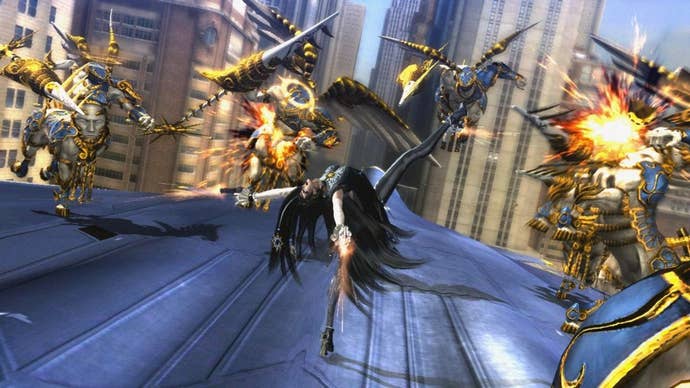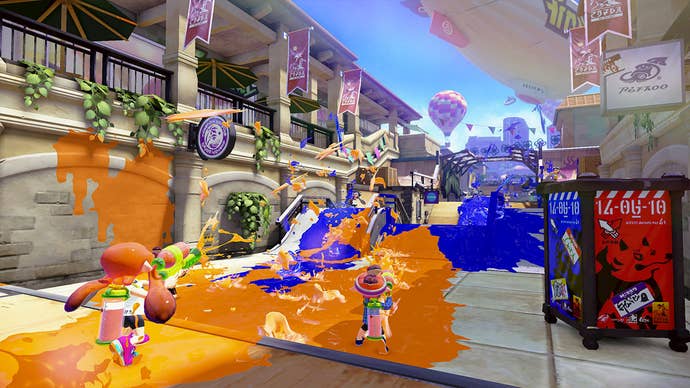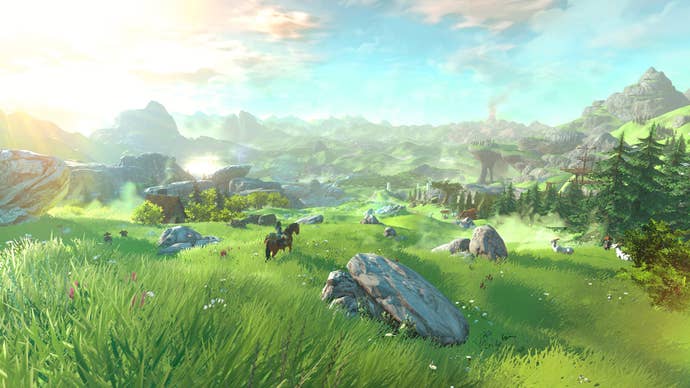2015 in Preview: Will Nintendo's Wii U Ever Be Part of the Conversation?
The Wii U is home to the best console exclusives of this generation, but that hasn't helped it gain an edge over the competition. Can 2015 be the year Nintendo gains more traction?
This article first appeared on USgamer, a partner publication of VG247. Some content, such as this article, has been migrated to VG247 for posterity after USgamer's closure - but it has not been edited or further vetted by the VG247 team.
If you're a regular USgamer reader, it shouldn't come as any surprise that we're big fans of the Wii U.
It's not like we've been paid off with Marth Amiibos or anything like that—rest assured, this love comes from an honest place. And if you need proof, just look at how many great Wii U games released last year: Mario Kart 8, Bayonetta 2, Super Smash Bros., Captain Toad: Treasure Tracker, and Donkey Kong: Tropical Freeze. Not all of them may float your boat, but there no denying the immaculate craftsmanship displayed by this small collection of games—especially during a year when things got more than a little buggy.

If you've been following Nintendo's consoles since the N64, though, you may notice these releases have something in common, something altogether unsurprising: They're either developed or subsidized by Nintendo itself. This wasn't what consumers were promised, though—during its E3 unveiling, Nintendo assured consumers the status quo would not continue as it had for the last 15 years, and this time, third parties would find the Wii U a much more welcoming platform than their three previous consoles. These plans quickly evaporated—and mostly served to bring Wii U owners great games from 2011 more than a year after the fact—leaving longtime Nintendo fans to think of the most polite way to say "I told you so."
While Nintendo has developed and released plenty of amazing Wii U games in 2014, in terms of the industry as a whole, it feels like their console is barely part of the discussion. And that's understandable; Nintendo has found themselves in a very Dreamcast-y situation with the Wii U, though thankfully, their conservative ways combined with the Pokemon behemoth means they're not going to suffer Sega's fate anytime soon. Despite their stubbornness, though, they've struggled with capturing the zeitgeist as effortlessly as they did with the Wii; at best, the new Smash Bros. gave the Wii U some much-deserved attention—especially on crowded convention floors—but that particular conversation has completely shifted to Nintendo's complete cock-up with their Amiibo line of collectible figurines.
So, we arrive at a particularly tough question: What, if anything, can Nintendo do to make the Wii U relevant for 2015? The past few years have seen them bringing out their biggest guns—and far earlier than with previous consoles. So far, we've seen Super Mario Bros. (a few times), Mario Kart, Pikmin, and Donkey Kong Country, though, despite providing plenty of reasons to invest in a Wii U, this collection of great games hasn't changed much for Nintendo. In 2015, they're getting ready to pull the trigger on two of their biggest franchises, one of which probably isn't as big as it used to be.

Of course, Star Fox doesn't have a poor reputation or anything—it's single-handedly responsible for some of the longest-lasting Internet memes—but this series has suffered a similar fate as Nintendo's Wario platformers. After creating a handful of great games, Nintendo immediately farmed the series out to third-party developers with mostly disappointing results; even the DS' Star Fox: Command, produced by Nintendo and some of the SNES debut's original developers, felt more like an odd experiment (with some bizarre—but entertaining—narrative choices) than a proper Star Fox game. And, while it's too early to make any definitive statements, this new Star Fox—at least, what we've heard about it—may be a little too reliant on the Wii U GamePad's unique features. The console is long overdue for someone to build a complete experience around the GamePad, but based on my time with the forgettable Game & Wario, that's easier said than done.
Nintendo's secret weapon for 2015—if they manage to get it out in time—is undoubtedly The Legend of Zelda. And, with this series, Nintendo's old-fashioned approach serves them well: Console Legend of Zeldas release every four-to-five years, making each one an event rather than a wearily accepted annual obligation. And, even though they've failed to deliver on their promises in the past—the end of 2003's The Wind Waker signaled a new direction for the series—this newest untitled Zelda exists as the result of everything Nintendo's learned from the glowing reception of 2013's A Link Between Worlds. The Wii's Skyward Sword felt very anti-Zelda with its failure to even attempt to disguise its linearity, and its outright fear of letting players explore on their own terms. A Link Between Worlds might have been a little too easy, but it did much to remind us how rewarding The Legend of Zelda used to be before its formula became so rigid and predictable.
A lot has changed for the action-RPG since 2011, though—even if Zelda's genre classification is a little fuzzy. 2011 gave us Dark Souls and Skyrim, two games that, despite how different they play than Zelda, have changed the rules and raised our standards for what we expect from these types of fantasy action games. Dark Souls in particular has completely replaced Zelda for many older fans; while Link's adventures never been punishingly difficult, FromSoftware's series has nonetheless managed to capture that same spirit of exploration and discovery that once stood as the main attraction throughout the early Zelda releases.

Nintendo has some other interesting releases in 2015, like the new Xenoblade, Kirby and the Rainbow Curse, Mario Maker, and Splatoon, but these feel geared towards those who've been riding the Wii U train since 2012. It's unlikely Nintendo can regain so much lost momentum with a single release, but if any game brings them closer to the competition, it can only be The Legend of Zelda. Right now, we've only been exposed to some brief footage and a mission statement from Eiji Aonuma, but if Nintendo doesn't compromise their vision, this latest installment could truly be something special, instead of just a prettier riff on the format established by A Link to the Past and Ocarina of Time. Keep in mind, though, that's a big could; The Legend of Zelda has a permanent place in video game culture, but 1998 was a long time ago. Plenty of people dropped $200 on a N64 at the very hint of a new Zelda game, but will today's consumers find the same prospect attractive?
2015 is likely the very last year Nintendo has to grow their Wii U user base, and if their current library can't convince consumers to invest in a new console, the responsibility for this tricky act rests squarely on the shoulders of The Legend of Zelda. And, in the passing years since Nintendo's Wii dominance, it's hard to say how much of a draw this series even is anymore. Zelda's growth has definitely been affected by its Nintendo exclusivity, meaning ubiquitous multiplatform franchises that came to power during the last console generation—like Call of Duty, Assassin's Creed, Dragon Age, Mass Effect, and others—have managed to grab the attention of tens of millions more. (Not that I'm suggesting Nintendo go third-party or anything like that. No no no.)
A head-turning Zelda could definitely help the Wii U recover, but to do so, Nintendo's going to have to surprise us all over again, much like they did with the controversial reveal of Toon Link at Space World 2001. I'm sure Zelda fans are resistant to change—it's become a series very much about its own tradition—but, if Nintendo wants to draw more skeptics to the Wii U, this latest sequel needs to do something drastic: an unexpected art style or redesign for Link (unlikely at this point, but still...), a brand new style of play, or maybe even—gasp!—giving the hero role to the titular character for once? Stranger things have happened, and if Nintendo want to attract more than just its own fanbase, 2015 needs a Zelda that can rumble with the big boys.
